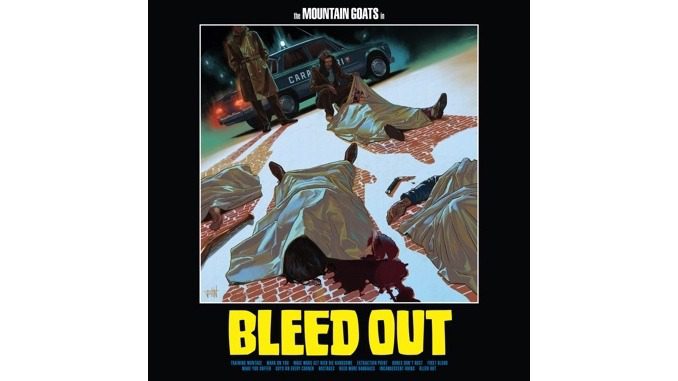It’s tempting to equate The Mountain Goats’ best songs with the most personal ones that John Darnielle has written. Take The Sunset Tree: Widely viewed as a standout effort, the group’s 2005 album was a wrenching, deeply compelling collection of songs about the physical abuse Darnielle experienced as a child. Yet the reason those songs connected with listeners wasn’t that they offered a window into a traumatic childhood, but rather the feeling of catharsis they represented. When Darnielle sang, “I am going to make it through this year if it kills me,” on “This Year,” he tapped into a universal sentiment.
He does something similar on The Mountain Goats’ new album, Bleed Out, though the context is vastly different. It’s an album about vengeance, but not in an autobiographical way. Instead of continually dredging up horrors from his youth, Darnielle has moved toward more broadly thematic material, on albums built around Bible verses, professional wrestling and goth culture, among other topics. The dozen songs on Bleed Out are personal only in the sense that Darnielle wrote them after spending a good chunk of that first pandemic winter on his couch in North Carolina, immersed in action movies. Revenge is usually the central plot point of those movies as unlikely heroes spill plenty of blood in a quest for redemption—the ultimate catharsis.
“In these movies and elsewhere, it’s such a dearly held trope, when in fact, I don’t think anybody really exacts much revenge in this life at all,” Darnielle says in the press notes for the album. “Because we all know that revenge is bullshit, right? The Greeks knew this. It’s never a zero-sum game. And yet the idea is so delicious, you can’t get enough of it.”
That’s the idea at the heart of the dozen new songs on Bleed Out. Darnielle sketches out action epics in miniature, capturing the clichés of the genre with wit, a vivid imagination and no small measure of pent-up energy. He sings with clenched-jaw determination on opening track “Training Montage,” which evokes exactly what the title describes: a guy in a basement preparing himself to hit back. “I’m doing this for revenge,” Darnielle announces on the chorus, just in case his narrator’s motives seemed hazy.
/p>
The songs here cover a wide range of situations: He’s a savvy mercenary with clear goals on the hard-charging “Wage Wars Get Rich Die Handsome,” a tough guy facing what could be his last stand on “Hostages” and a young man forced into a life-or-death situation he never wanted on “Need More Bandages.” Sometimes the action has a gangland feel: “Guys on Every Corner” threatens payback from an army of thugs—“a couple of Chicago guys, a robust East Bay delegation.” Other times, the impending payback is almost surgical: “Maybe you will see me coming / But I don’t think you will,” Darnielle sings on “Mark on You,” as his narrator tracks his quarry, waiting for the right moment to strike.
/p>
The musical arrangements on Bleed Out are as varied as the revenge fantasies, though most of these songs are up-tempo, reflecting the pumping adrenaline of their source material. Electric guitars surge through “Mark on You,” while a twitchy beat and busy bassline power “First Blood.” Raunchy saxophone and gleaming wet disco guitars give “Guys on Every Corner” a distinctive aesthetic—picture a wiseguy going about his daily neighborhood routine, knowing some bit of ritualistic violence is imminent and feeling almost eager to deliver a counterpunch. Some of the musical adornments can occasionally feel out of place—soprano saxophone sounds almost too pensive over the thrumming bassline on “Extraction Point,” for example—but sometimes what sounds like a gentle song escalates quickly. Darnielle’s airy melody and meandering guitars on the seventh track pivot suddenly into a gritty refrain when he sings, “I’m gonna make you suffer.”
It’s an empty threat. Darnielle is having so much fun splashing around in the cinematic world of gory retribution that his delight is, perversely, inclusive and inviting. As they say, it’s better than bottling it up.
Eric R. Danton has been contributing to Paste since 2013, and writing about music and pop culture for longer than he cares to admit. Follow him on Twitter or visit his website.
Watch a 2009 Mountain Goats performance from the Paste archives below.




